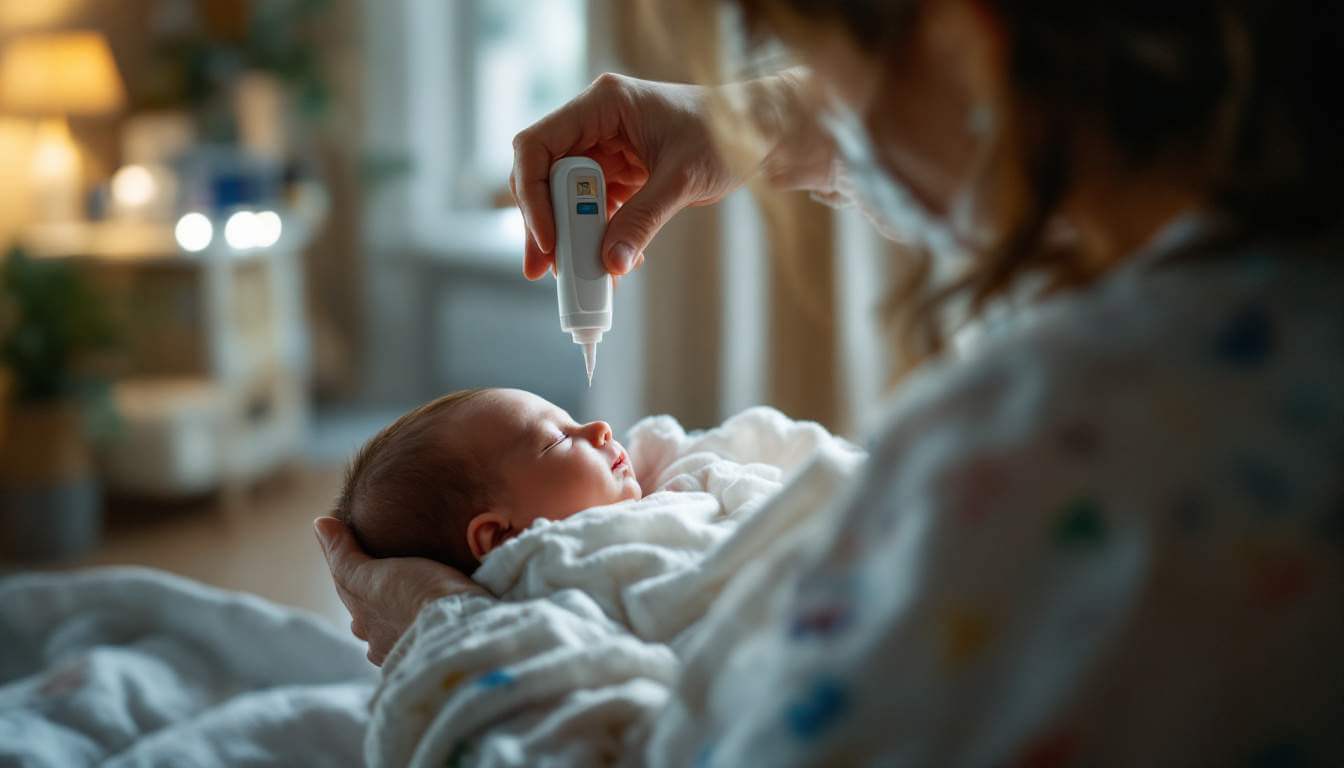Table of Contents
Newborn screening is a critical process that ensures the health and well-being of infants shortly after birth. In New York, this program encompasses various tests designed to detect potentially serious health conditions. It provides an opportunity for early intervention, ultimately leading to better health outcomes for newborns. This article aims to inform parents about the intricacies of newborn screening, its importance, the types of screenings available, what to expect during the process, and how to interpret the results.
Understanding Newborn Screening
Newborn screening involves a series of tests performed within the first few days of a baby's life. These tests are vital for identifying conditions that may not be immediately apparent but can have severe consequences if left undiagnosed.
The Purpose of Newborn Screening
The primary purpose of newborn screening is to detect health issues early, allowing for timely interventions. Conditions such as metabolic disorders, congenital heart disease, and hearing impairments can affect a child's development and overall quality of life. Early detection enables healthcare providers to implement treatment before symptoms arise.
Moreover, newborn screening plays a crucial role in public health by reducing the long-term costs associated with untreated conditions. By identifying and managing these health issues early, families can avoid the emotional and financial burdens that often accompany chronic illnesses. This proactive approach not only benefits the individual child but also contributes to healthier communities overall, as fewer children will require intensive medical interventions later in life.
The Process of Newborn Screening
The screening process typically begins within 24 to 48 hours after birth. Healthcare professionals collect a small blood sample from the heel of the infant, which is then tested for various conditions. The process is quick and generally painless for the baby.
In addition to blood tests, newborns may undergo tests for hearing and heart conditions, making the screening process comprehensive and covering a range of potential health issues. Hearing tests, for instance, are essential as early identification of hearing loss can significantly improve language development and social skills. Similarly, pulse oximetry is a non-invasive test used to detect critical congenital heart defects by measuring the oxygen levels in the baby's blood. These combined efforts ensure that various aspects of a newborn's health are monitored closely, providing a solid foundation for their future well-being.
The Importance of Newborn Screening
The significance of newborn screening cannot be overstated. By identifying health issues early, parents and healthcare providers can take proactive steps to ensure the child's healthy development. This early intervention can set the stage for a lifetime of good health and well-being, making it a critical component of pediatric care.
Early Detection and Treatment
When conditions are detected early, treatment can begin promptly. For instance, a newborn diagnosed with a metabolic disorder may be placed on a special diet or given medication, significantly improving their chances for a normal, healthy life. These interventions can prevent the onset of symptoms that could hinder the child's growth and development, allowing them to reach important developmental milestones alongside their peers.
Early intervention can also minimize the potential for complications, allowing children to thrive and develop alongside their peers. Furthermore, the psychological benefits for families cannot be overlooked; knowing that their child is receiving the necessary care provides peace of mind and fosters a supportive environment for growth.
Preventing Long-Term Health Issues
Long-term health issues can often be mitigated or entirely prevented through effective newborn screening. Conditions that could lead to serious complications later in life, such as certain genetic disorders or hearing loss, are identified and treated early. For example, early detection of congenital hypothyroidism can prevent intellectual disabilities and growth delays if treated within the first few weeks of life.
Parents who understand the importance of newborn screening are more likely to advocate for their child's health, leading to improved outcomes in the long term. Additionally, public awareness campaigns and educational programs can empower families with knowledge about the screening process and the conditions it tests for, ensuring that more children benefit from these critical health checks. Engaging communities in discussions about the importance of screening can also lead to increased participation and support for healthcare initiatives aimed at improving newborn health outcomes.
Types of Newborn Screenings in New York
In New York, several types of screenings are included in the newborn screening program, each designed to detect different health conditions.
Metabolic Disorder Screening
Metabolic disorders are a group of conditions that affect how the body uses food for energy. Some of these conditions can lead to severe health complications if not detected and treated early. New York screens for a variety of metabolic disorders, including phenylketonuria (PKU) and congenital adrenal hyperplasia (CAH). These screenings are crucial because they can identify disorders that may not show symptoms until later in life, allowing for early dietary interventions or medical treatments that can significantly improve the child's quality of life. Additionally, the state has implemented follow-up protocols to ensure that families receive the necessary support and resources for managing these conditions.
Heart Disease Screening
Congenital heart defects are among the most common birth defects. Screening for heart disease typically involves a simple test called pulse oximetry, which measures the amount of oxygen in the baby's blood. Early detection can lead to necessary interventions, potentially saving lives. In New York, this screening is part of a broader initiative to monitor and address heart health in infants, with healthcare professionals trained to recognize signs that may warrant further investigation. If a newborn fails the initial screening, follow-up tests are conducted to confirm the diagnosis and determine the best course of action, which may include medication or surgical procedures, depending on the severity of the condition.
Hearing Loss Screening
Hearing impairment can significantly affect a child's speech and language development. Newborns receive a hearing test to ensure they can hear properly. Early detection allows for timely therapies, setting the foundation for effective communication skills. In New York, the hearing screening program is designed to identify potential hearing issues as soon as possible, often within the first few days of life. If a baby does not pass the initial screening, they are referred for further evaluation, which may include more comprehensive auditory testing. The state also provides resources for families, including access to audiologists and speech therapists, to support the child's development and ensure they receive the necessary interventions to thrive in their early years.
What to Expect During the Screening Process
Parents may feel anxious about the newborn screening process, so knowing what to expect can help ease those worries.
The Heel Prick Test
The heel prick test involves a healthcare provider making a small puncture in the baby's heel to collect blood. This may sound intimidating, but the procedure is swift, and parents often report that their babies cry only briefly during the process.
It's important for parents to comfort their newborns afterward to help soothe them from the experience. Many hospitals provide a warm blanket or skin-to-skin contact to help calm the baby, which can be beneficial for both the infant and the parents. This moment can also serve as an opportunity for bonding, allowing parents to reassure their little ones with gentle words and soft touches.
The Hearing Test
After the heel prick, newborns typically receive a hearing test. This can be done using two common methods: an automated auditory brainstem response (AABR) or an otoacoustic emissions (OAE) test. Both tests are non-invasive and aim to determine whether the infant can hear at normal levels.
Healthcare providers will explain the tests and their significance, making sure parents are informed throughout the process. The AABR test involves placing small sensors on the baby's head and playing soft sounds, while the OAE test uses a tiny microphone placed in the ear canal to measure sound waves produced in the inner ear. These tests are quick and usually completed within a few minutes, allowing parents to feel reassured about their baby's hearing health without a prolonged wait.
Understanding the importance of these screenings can help alleviate parental anxiety. Early detection of hearing issues can lead to timely interventions, which are crucial for language development and overall communication skills. Parents are encouraged to ask questions and engage with the healthcare team to gain a deeper understanding of the results and any necessary follow-up actions.
Interpreting the Results
Once the screenings are completed, understanding the results is crucial for parents.
Understanding Positive Results
A positive result on a newborn screening can be alarming, but it does not always mean that the baby has a particular condition. Most positive results require further testing to confirm any issues. If a follow-up test indicates a concern, healthcare providers will introduce possible treatment options and next steps.
Understanding Negative Results
Negative results, which indicate no detected health issues, are a relief for most parents. However, it's essential to remember that continued monitoring and regular check-ups are still vital as the child grows. Some health conditions can develop later in life, making ongoing health assessments important.
In summary, newborn screening is a vital process that helps safeguard the health of infants, allowing for early detection and intervention for various conditions. By understanding what to expect and the implications of the tests, parents can be proactive in ensuring their child's health and development.






